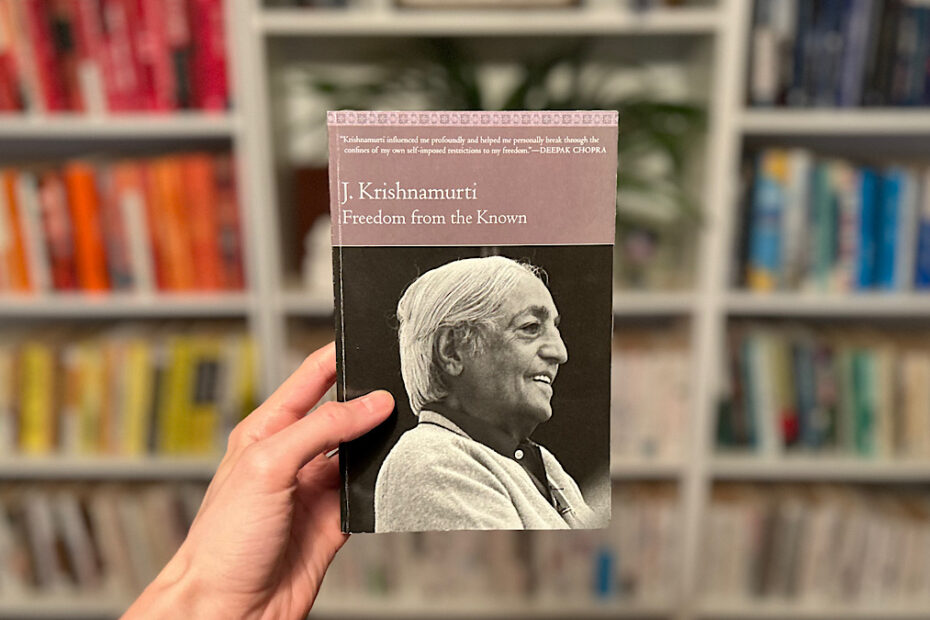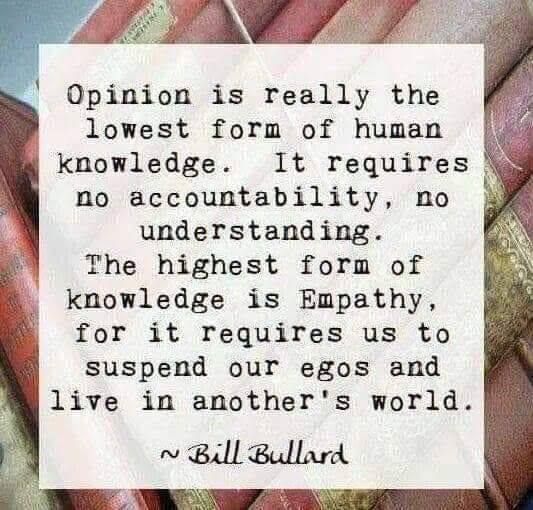“Wisdom cannot be communicated. Wisdom that a wise man tries to communicate always sounds foolish. Knowledge can be communicated, but not wisdom. We can find it, we can live it, we can be carried by it, we can work wonders with it, but we cannot utter it or teach it.”
Hermann Hesse, Siddhartha (Page 124)
26 J. Krishnamurti Quotes from Freedom From The Known For A More Liberated, “First-Hand” Life Experience
Excerpt: This collection of J. Krishnamurti quotes will challenge you and your beliefs, give you fresh perspectives, and leave you feeling liberated…
Read More »26 J. Krishnamurti Quotes from Freedom From The Known For A More Liberated, “First-Hand” Life Experience
“When I examine myself and my methods of thought, I come to the conclusion that the gift of fantasy has meant more to me than my talent for absorbing positive knowledge.”
Albert Einstein, via Essentialism (Page 87)
“To know means to accumulate, to collect information, to collect data. It does not change you—you remain the same; just your collection of information becomes bigger and bigger. Wisdom transforms you. It is really in-formation, not just ‘information’—it forms your inner being in a new way. It is transformation. It creates a new quality of seeing, knowing, being. So it is possible for a person to be not at all informed and yet be wise. It is also possible for a person to be very much informed and still be very unwise.”
Osho, Everyday Osho (Page 110)
“When I use the word ignorance, I don’t use it in any negative sense—I don’t mean absence of knowledge. I mean something very fundamental, very present, very positive. It is how we are. It is the very nature of existence to remain mysterious, and that’s why it is so beautiful.”
Osho, Everyday Osho (Page 17)
“When I left him, I reasoned thus with myself: I am wiser than this man, for neither of us appears to know anything great and good; but he fancies he knows something, although he knows nothing; whereas I, as I do not know anything, so I do not fancy I do. In this trifling particular, then, I appear to be wiser than he, because I do not fancy I know what I do not know.”
Socrates, via The Daily Laws (Page 373)
“Events in life mean nothing if you do not reflect on them in a deep way, and ideas from books are pointless if they have no application to life as you life it. In strategy all of life is a game that you are playing. This game is exciting but also requires deep and serious attention. The stakes are so high. What you know must translate into action, and action must translate into knowledge. In this way strategy becomes a lifelong challenge and the source of constant pleasure in surmounting difficulties and solving problems.”
Robert Greene, The Daily Laws (Page 303)
“A person who knows all sciences but does not know himself is a poor and ignorant person. He who does not know anything except for his inner spiritual self is an enlightened person.”
Leo Tolstoy, A Calendar of Wisdom (Page 252)
“What we are after is the root and not the branches. The root is the real knowledge; the branches are surface knowledge. Real knowledge breeds ‘body feel’ and personal expression; surface knowledge breeds mechanical conditioning and imposing limitation and squelches creativity.”
Bruce Lee, Striking Thoughts (Page 11)
“There are two very clear indications of real science and real art: the first inner sign is that a scholar or an artist works not for profit, but for sacrifice, for his calling; the second, outer sign is that his works are understandable to all people. Real science studies and makes accessible that knowledge which people at that period of history think important, and real art transfers this truth from the domain of knowledge to the domain of feelings.”
Leo Tolstoy, A Calendar of Wisdom (Page 196)
“To [Bruce] Lee’s way of thinking, any answer he could provide is worth nothing to any other individual, unless that individual has come to see its validity as a result of his own independent thought on the matter.”
John Little, via Striking Thoughts (Page xxiv)
“Much has been said of the loneliness of wisdom, and how much the Truth seeker becomes a pilgrim wandering from start to star. To the ignorant, the wise man is lonely because he abides in distant heights of the mind. But the wise man himself does not feel lonely. Wisdom brings him nearer to life; closer to the heart of the world than the foolish man can ever be. Bookishness may lead to loneliness, and scholarship may end in a battle of beliefs, but the wise man gazing off into space sees not an emptiness, but a space full of life, truth, and law.”
Manly P. Hall
“Ignorance in itself is neither shameful nor harmful. Nobody can know everything. But pretending that you know what you actually do not know is both shameful and harmful.”
Leo Tolstoy, A Calendar of Wisdom (Page 121)
“Real wisdom is not the knowledge of everything, but the knowledge of which things in life are necessary, which are less necessary, and which are completely unnecessary to know. Among the most necessary knowledge is the knowledge of how to live well, that is, how to produce the least possible evil and the greatest goodness in one’s life. At present, people study useless sciences, but forget to study this, the most important knowledge.”
Leo Tolstoy, A Calendar of Wisdom (Page 88)
“Knowledge is always progressing. Don’t let your ego fool you. You are always knowledge’s inferior.”
Robert Greene, The Daily Laws (Page 94)
“The merit of a man is not in the knowledge he possesses, but in the effort he made to achieve it.”
Gotthold Ephraim Lessing, A Calendar of Wisdom (Page 41)
“It is better to know several basic rules of life than to study many unnecessary sciences. The major rules of life will stop you from evil and show you the good path in life; but the knowledge of many unnecessary sciences may lead you into the temptation of pride, and stop you from understanding the basic rules of life.”
Leo Tolstoy, A Calendar of Wisdom (Page 37)
“A thought can advance your life in the right direction only when it answers questions which were asked by your soul. A thought which was first borrowed from someone else and then accepted by your mind and memory does not really much influence your life, and sometimes leads you in the wrong direction.”
Leo Tolstoy, A Calendar of Wisdom (Page 21)

